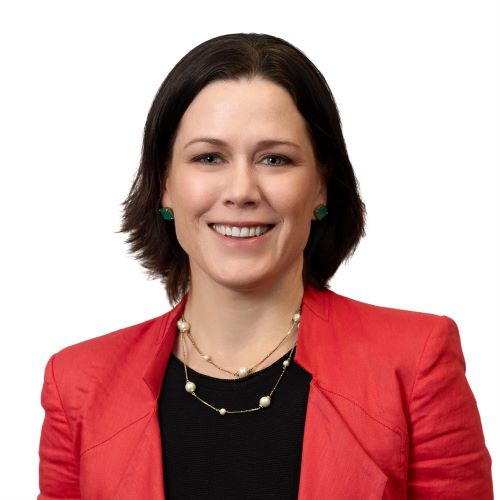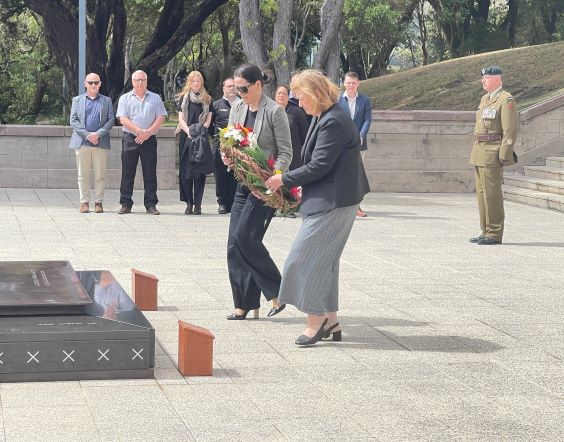From the Department
Alison Frame
Secretary, Department of Veterans’ Affairs

When I penned my first column as Secretary one year ago, I said it was clear DVA’s legislative arrangements were not fit for purpose and that our priority was to eliminate the claims backlog and make sure it does not happen again. A year on, I am proud of the progress we have made on these issues and acutely aware of the work that still lies ahead.
We were able to allocate all claims for processing in advance of the Royal Commission’s deadline. However I recognise that this milestone, while significant, does not mean that all outstanding claims have been determined. I apologise to those veterans who are still awaiting an outcome and have been waiting for some time. Please know that our determinations rate is accelerating and that all claims over two weeks old are now on an active case load of a claims support officer or delegate in DVA (see article on front page).
The highlight of my first year in the job has been engaging directly with the veteran community to deepen my own understanding of service, and what veterans and veteran families need from DVA. I have also been delighted by the broader community’s willingness to work constructively with DVA as we pursue improvements.
This year, we are expanding our engagements with the veteran community to ensure that our services are informed by, and respond to, the lived experiences of our clients. In addition to our more traditional ways of engaging with the community, we have increased the emphasis on a ‘co-design’ approach. This ensures that we are working in partnership with the veteran community to understand your concerns, listen to your views and embed this advice into DVA policies, programs and operational practices.
In response to input from veterans and families, DVA has established an Aged & Community Care Taskforce. This recognises that transition into aged care can be as significant a change as when one transitions from Defence. This work has been guided by an initial stakeholder workshop to establish priorities and aims.
This is an exciting opportunity to deliver a structured approach to aged care services that allows DVA to respond to the complex and evolving changes that are happening more broadly across the aged care sector. I look forward to the real benefits and positive difference this work will make to the lives of our ageing veteran and dependant clients, and their families.
It is clear that it will take more than DVA alone to address the issues facing the veteran community, so I see great possibilities for even deeper engagement and collaboration with the Department of Defence, ex-service organisations and other government agencies to be part of new initiatives and approaches.
In February, I briefly visited New Zealand, where I met with senior government officials to share opportunities and challenges in improving services for veterans and their families. I co-hosted a Five Eyes meeting on Veterans’ Affairs with my New Zealand counterpart, with colleagues from Canada, the US and the UK joining us online. The experience strengthened our relationship with these close allies and was a valuable opportunity to hear new perspectives and ideas, and to ensure we are aligning our efforts as much as possible.
While in New Zealand I paid my respects at the Pukeahu National War Memorial and the Australian Memorial. These monuments serve as a reminder of the long and close relationship between our two nations and our shared experience of war and sacrifice. This is particularly pertinent as we approach Anzac Day.
The Department’s focus is now shifting to supporting many new DVA clients to access the financial, health and wellbeing support and services for which they are eligible. DVA is positioning to meet the growing demand for our services with innovative customer service and continually adapting our services to meet the changing needs of the veteran community.
We are delivering business improvements to better support our clients by standardising forms, modernising our IT systems, improving MyService and enhancing our modelling capabilities to plan for the future.
The Royal Commission into Defence and Veteran Suicide will hand down its final report and recommendations in September 2024, and the report is likely to touch on many aspects of how DVA operates. Supporting the work of the Royal Commission has been a huge focus in DVA since it commenced. We will continue to support the Commission while also preparing for its recommendations, the Government’s response and implementing the agreed recommendations.
Finally, I want to acknowledge and thank DVA’s dedicated staff for the many ways they go above and beyond to assist veterans. In one recent example, our staff ensured veterans affected by the flooding in North Queensland could continue to access important medicines from their local pharmacy. This was an enormous effort that required a new legislative instrument – all achieved in record time.
I welcome your continued and valued participation in the work of the Department as we continue on our mission to support the veteran community.

Laying a wreath at the Tomb of the Unknown Warrior alongside Ms Bernadine MacKenzie, Head of Veterans’ Affairs New Zealand.